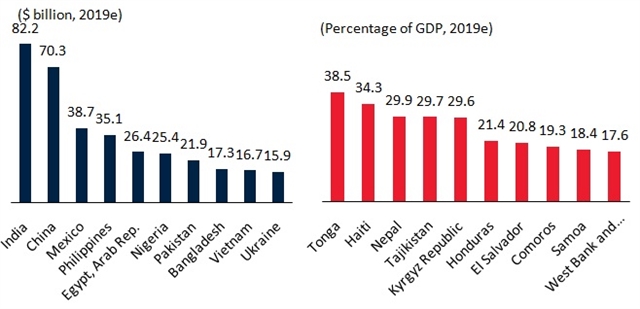Viet Nam was expected to remain one of the top ten remittance receivers in 2019, according to the latest edition of the World Bank’s Migration and Development Brief released recently.

Viet Nam was expected to remain one of the top ten remittance receivers in 2019, according to the latest edition of the World Bank’s Migration and Development Brief released recently.
A sum of US$16.7 billion in remittances was projected to flow into Viet Nam for the full year, making the Southeast Asian country the ninth largest remittance receiver – in dollar terms – in the world.
The value inches up against $16 billion in 2018 and accounts for some 6.4 per cent of the country’s GDP.
In the East Asia and Pacific region, Viet Nam is expected to rank third in terms of remittances after China and the Philippines.
Financial and banking expert Nguyen Tri Hieu told Viet Nam News that the country’s high remittance flow was mainly because Vietnamese people working abroad believed in the stability of the economy and saw better investment opportunities in the domestic market.
Hieu said that remittances to Viet Nam were largely used to invest in production, business and the real estate market.
“The central bank’s policy to keep zero interest rate for deposits in US dollars will encourage remittances into Viet Nam to be used for investment rather than being kept in banks,” Hieu said.
Remittance to Viet Nam has kept rising for the past two decades, from more than $1.3 billion in 2000 to $16 billion last year (except the year of 2009 due to adverse impacts of the global financial crisis).
According to the WB’s brief, in 2019, the top five remittance recipient countries are projected to be India ($82.2 billion), China ($70.3 billion), Mexico ($38.7 billion), the Philippines ($35.1 billion) and Egypt ($26.4 billion).
Remittance flows to low- and middle-income countries are expected to reach $551 billion in 2019, up by 4.7 per cent compared to 2018. Remittances have exceeded official aid – by a factor of three – since the mid-1990s. This year, they are on track to overtake foreign direct investment (FDI) flows to LMICs.
This year, remittances will increase moderately in South Asia (5.3 per cent), Sub-Saharan Africa (5.1 per cent) and East Asia and Pacific (3.8 per cent) due to the buoyancy in inflows from the US being offset by slower growth of receipts from the Euro area and the Gulf Cooperation Council (GCC).
Growth of remittance flows slowed to 4.7 per cent in 2019 compared to a robust 8.6 per cent in 2018, the brief noted, adding that cyclical factors affecting the growth of remittance flows include economic growth in source countries, oil price and variations in exchange rates.
According to the brief, assuming that outward remittances growth in tandem with the nominal GDP (in US dollar terms) of the source countries, these flows are projected to reach $574 billion in 2020 and $597 billion by 2021.
This forecast methodology is conservative, as it does not account for increasing migration flows, falling remittance costs, and progress in technology of remittance services, the brief noted. VNS





